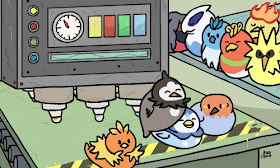to exemplify the key role of the Other’s knowledge: a man who believes himself to be a kernel of grain is taken to a mental institution where the doctors do their best to convince him that he is not a kernel of grain but a man; however, when he is cured (convinced that he is not a kernel of grain but a man) and allowed to leave the hospital, he immediately comes back, trembling and very scared—there is a chicken outside the door, and he is afraid it will eat him. “My dear fellow,” says his doctor, “you know very well that you are not a kernel of grain but a man.” “Of course I know,” replies the patient, “but does the chicken?”
Therein resides the true stake of psychoanalytic treatment: it is not enough to convince the patient about the unconscious truth of his symptoms; the unconscious itself must be brought to assume this truth. The same holds true for the Marxian theory of commodity fetishism: we can imagine a bourgeois subject attending a Marxism course where he is taught about commodity fetishism. After the course, he comes back to his teacher, complaining that he is still the victim of commodity fetishism. The teacher tells him “But you know now how things stand, that commodities are only expressions of social relations, that there is nothing magic about them!” to which the pupil replies: “Of course I know all that, but the commodities I am dealing with seem not to know it!” This is what Lacan aimed at in his claim that the true formula of materialism is not “God doesn’t exist,” but “God is unconscious.
from Zizek’s Jokes

